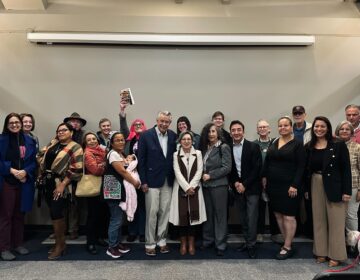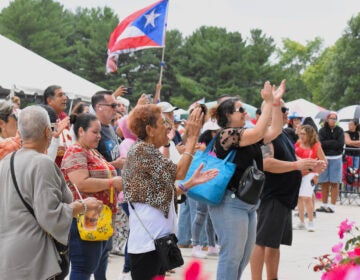Post pandemic, Latino businesses in southern Delaware strive to regain footing
Latino-owned businesses have tended to receive less support from the government and have had a harder time recovering from pandemic-related losses.
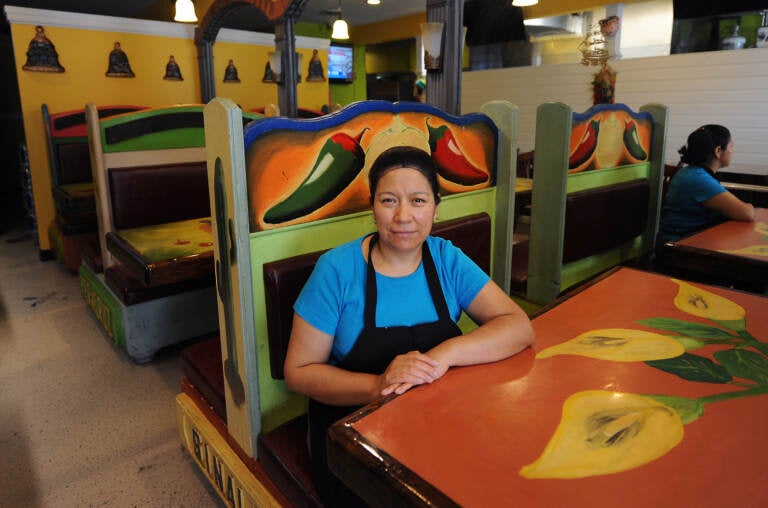
Maudy Mendez, owner of Maudy's Hispanic Cuisine located on East Market Street in Georgetown, takes a brief break from cooking on Wednesday. (Butch Comegys/Delaware State News)
After opening in October 2019 in Georgetown, Delaware, Maudy’s Hispanic Cuisine quickly developed a favorable reputation for its authentic Mexican dishes and comforting atmosphere. Less than six months later, the positive momentum the business had generated suddenly stalled, a victim of the COVID-19 pandemic.
Not long after Gov. John Carney declared a state of emergency in Delaware in March 2020 and limited all restaurants to take-out service only, the once-thriving and lively restaurant saw fewer and fewer patrons at its doors. Like many other food-service establishments, Maudy’s closed entirely. During that three-month shutdown owner Maudilia Mendez thought about closing for good.
Maudy’s is open again, foot traffic is picking up, and even some tourists are popping into the restaurant at 21 East Market Street. However, Mendez worries that with COVID’s delta variant on the rise in Delaware and throughout the nation, things will get worse again.
“[People are] still afraid of COVID and now delta is making people stay home again,” she said.
Latino businesses, like many others in Sussex County, have been affected in varying ways by the pandemic. Some have adjusted and managed to grow while others are just struggling to survive.
Barriers to getting help
Compared to their white-owned counterparts, Latino-owned businesses have tended to receive less support from the government and therefore have had a harder time recovering from pandemic-related losses.
According to a national study in 2020 by Stanford University’s Latino Entrepreneurship Initiative, Latino-owned businesses do not have as large of a cash buffer as white-owned businesses and were less likely to receive funding from the federal Paycheck Protection Program to help them recover.
Also, Latino-owned businesses faced some challenges not encountered by their counterparts when seeking help from the government.
“Applications were in English, and they were online and for a lot of the very, very small businesses who aren’t proficient in English or technology, it was challenging for many of them to get access to the relief that was [available] through the state,” said Mary Dupont, an economic development consultant and member of the Delaware Hispanic Commission. Dupont is the former state director of financial empowerment, a role in which she led the creation of the Stand By Me initiatives to promote economic security for low- and moderate-income Delawareans.
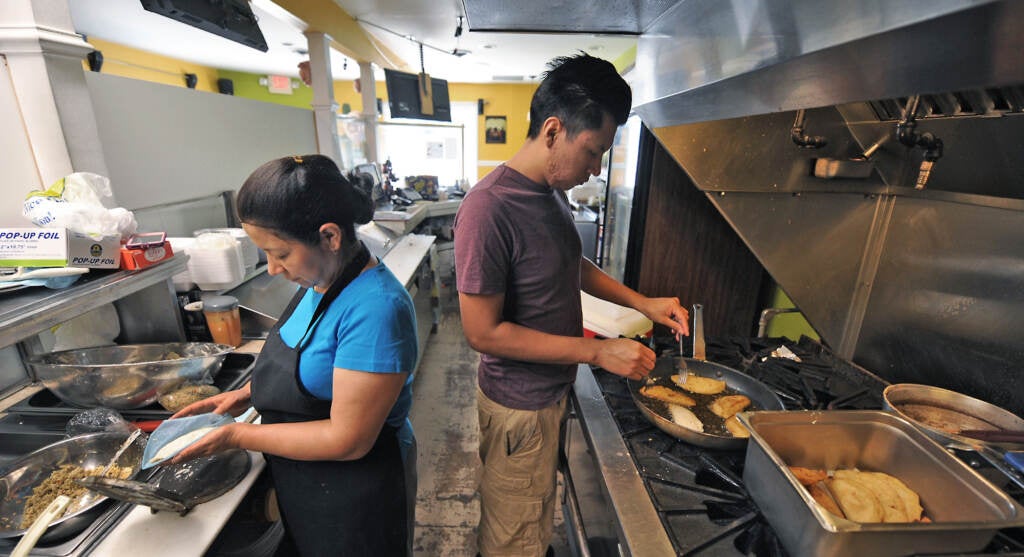
To help Latino business owners, Dupont; Maria Freudenthal of Stand By Me Negocios, a partnership of the state and United Way of Delaware; and Patricia Rivera, the founder of Hook PR & Marketing, worked together last winter to assist with the completion of COVID-19 relief applications.
Working with the state Division of Small Business, they arranged webinars and one-on-one support sessions to help businesses through the application process. Dupont is hopeful that people will take advantage of the services knowing how the pandemic has affected Latino businesses.
“I think a lot of businesses are struggling,” she said. “COVID was a big setback, especially for people in the personal services and hospitality and restaurants and house-cleaning companies.”
Some Latino-owned businesses were able to get through the paperwork and receive support from two programs managed by the state Division of Small Business. That help included Delaware Relief Grants, which were available to a broad spectrum of businesses, and the Hospitality Emergency Loan Program, designed to support restaurants, bars, and personal services enterprises.
“A lot of Latino-owned businesses took a hit but it’s amazing because a lot of them actually did survive,” Dupont said.
Expanding business opportunities
In addition to helping with COVID-19 relief applications, Dupont is director of a revitalization project called Plaza Latina, which aims to create more business opportunities and include Latino business owners and their cultures in the greater Georgetown community.
The project is focused on enhancing the shops now open on North Race Street and on recruiting more businesses – both retail and restaurants – to the plaza. It’s a three-pronged plan that will take approximately five years to complete if approved by the Georgetown Town Council. The goal is for North Race Street to become a place filled with Latin American culture and to elevate the business owners who inhabit the space.
One Latino-owned business in Georgetown that has survived the pandemic and is again thriving is Caruso’s Pizza and Pasta Italian Eatery.
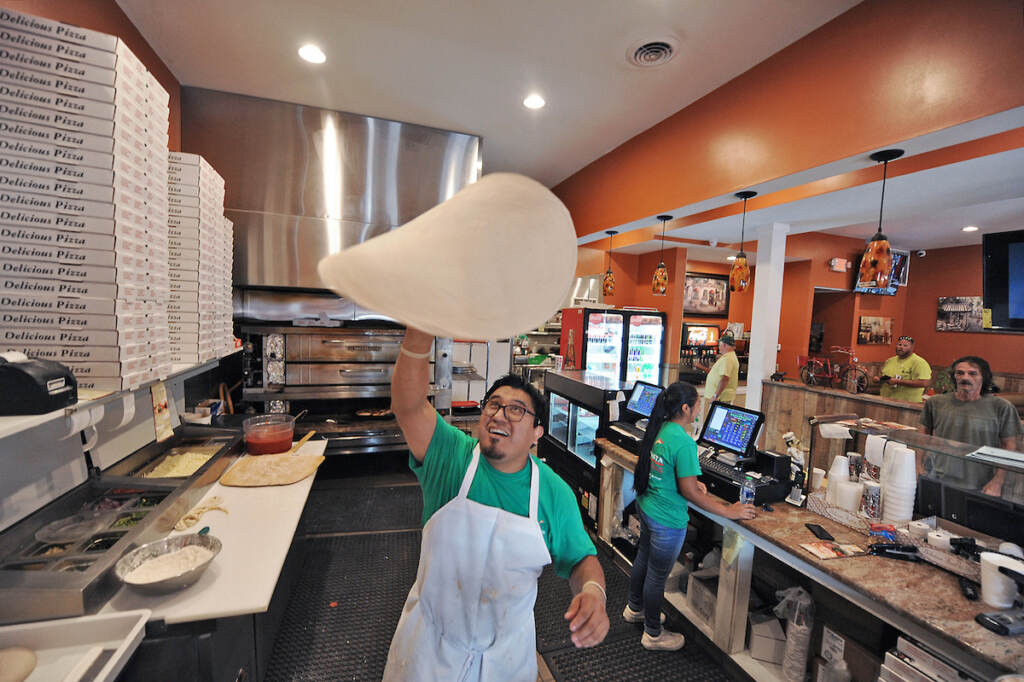
Before the business began to revive post-pandemic, Caruso’s had to overcome some hardships of its own. Just as the pandemic hit, owner Manuel Pedraza was securing permits to open at a new location, less than a block away on East Market Street. He received the permits in May but couldn’t open because of pandemic closure mandates.
When Caruso’s was able to open, eat-in dining was not permitted, so the restaurant shifted to a takeout-only model. That did not generate as much traffic as Pedraza had hoped, so he began offering a delivery service and soon realized an increase in orders. Pedraza recommends that other businesses consider adding deliveries to their service menu as a way to drive up orders.
While coping with pandemic issues, Pedraza realized that Caruso’s could not simply maintain the same offerings that had previously been on the menu. Adding new food items and increasing special pizza deals has helped the business keep up during this recovery period, he said.
Keeping the community informed
Other factors add to the challenges faced by Latino business owners as they work their way through the pandemic.
Jose Somalo, founder of the Hispanic newspaper “Hoy en Delaware,” pointed out that Latino-owned small businesses are frequently family-based. That means when one person gets sick, it can hurt both the business and the family’s health.
He said another concern is that some business owners may be undocumented residents, making them unable to apply for various federal and state relief grants offered during the pandemic. Members of the Latino community rallied to support those in need, participating in activities like gathering food for others, he said.
Another media executive, Kevin Andrade, CEO of the Georgetown-based The Voice Radio Network, which includes two Spanish-language stations, stresses the importance of keeping the Latino community well-informed, about both government mandates and pandemic-related developments.
“The only method of communication for Latino businesses who don’t speak English [is] the radio,” Andrade said. “So, as a radio station, we’re able to let people know what’s going on during the pandemic, informing [them] every day in their own language.”
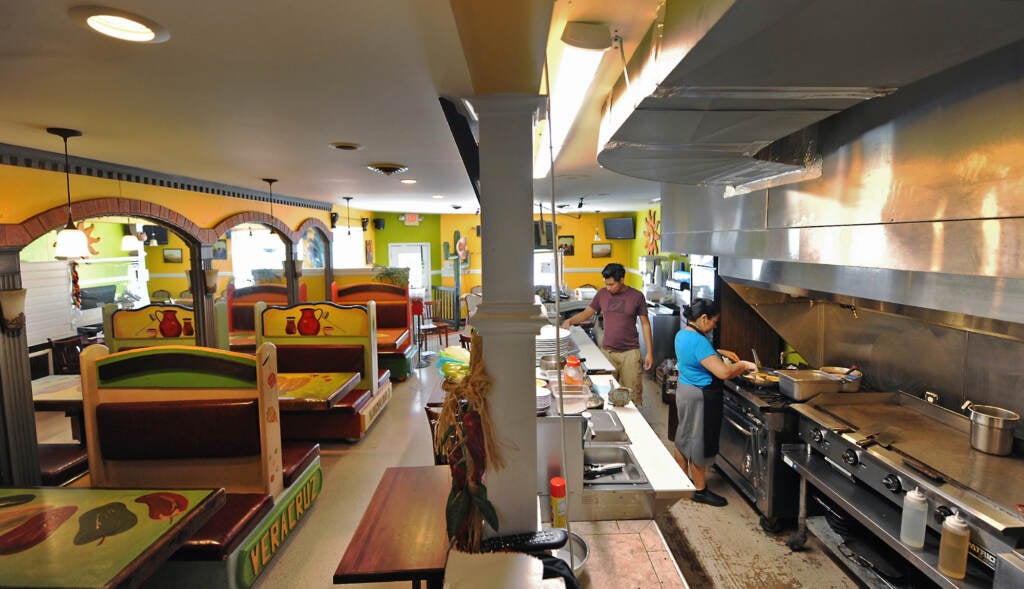
As with many English-language broadcast operations, Andrade’s stations – Maxima 95.3 FM and the Mexican-oriented La Raza 100.3 FM and 106.7 FM – have broadened their offerings, establishing a digital footprint to deliver advertising and community information through audio, visual, and social media.
Even relatively simple services – like letting listeners know which restaurants were closed and which ones were doing takeout only – benefited both businesses and the community at large, he said.
Along with helping businesses improve, the station has seen a lot of growth as well. “We increased our audience online. A lot more people were attracted to receive our information in our show through the videos we’re broadcasting through social media,” he said.
According to Andrade, the radio station had approximately 17,000 followers before the pandemic and now has about 500,000 followers online, including people from Delaware and Maryland.
As businesses continue to recover from the pandemic, many owners are concerned that the delta variant may disrupt their operations again. However, Dupont, citing what owners learned from their experiences, offered a hopeful assessment.
“They know they’re gonna have to pivot because last time, it was just a shock,” she said. “People might be more prepared. At least they know they’ve been there, and they know they’re gonna have to do things differently. It’s not business as usual.”
—
This article was produced with the support of a grant from the Delaware Community Foundation. For more information visit https://www.delcf.org/journalism/

Get daily updates from WHYY News!
WHYY is your source for fact-based, in-depth journalism and information. As a nonprofit organization, we rely on financial support from readers like you. Please give today.




![CoronavirusPandemic_1024x512[1]](https://whyy.org/wp-content/uploads/2020/03/CoronavirusPandemic_1024x5121-300x150.jpg)
